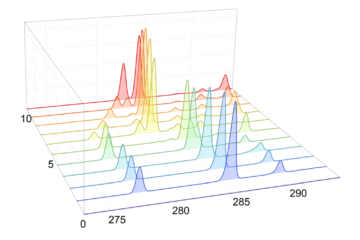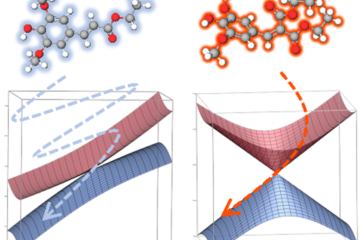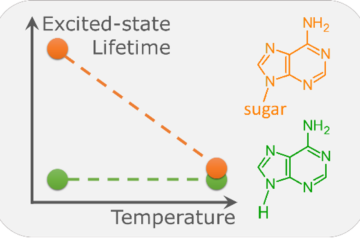Resonant Auger spectroscopy probes conjugation effects in core-excited aromatic molecules.
In brief:
- A novel approach for an indirect probing of conjugation and hyperconjugation in core-excited molecules using resonant Auger spectroscopy is proposed.
- Changes in electronic structure occurring in the process of resonant sulfur K-shell excitation and Auger decay affect the stabilization energy resulting from π−conjugation and hyperconjugation.
Tatiana Marchenko’s team proposed a novel approach for an indirect probing of conjugation and hyperconjugation in core-excited molecules using resonant Auger spectroscopy.
They recorded high-resolution Auger sulfur KL2,3L2,3 2D maps for thiophene (C4H4S), thiazole C3H3NS), and thiolane (C4H8S) at the HAXPES end-station on the GALAXIES beamline at the synchrotron SOLEIL. Their analysis of the experimental data in the conjugated thiophene and thiazole molecules showed that the energy order of the first two core-excited states and the corresponding final states reverses in the process of core excitation and resonant spectator Auger decay. This effect is absent in thiolane, the saturated analog of thiophene.
These experimental observations were interpreted using high-level quantum-mechanical calculations and the natural bond orbital analysis performed by Carlos de Moura. The IS-MCSCF calculations assign the lowest core-excited states in the conjugated molecules as S 1s−1π* and S 1s−1σ*S−C. The calculated electron transition energies reproduce the experimentally observed order inversion: in the intermediate state E(1s−1π*) < E(1s−1σ*), whereas in the final state E(2p−2π*) > E(2p−2σ*).
The NBO method allowed us to evaluate the stabilization energy in the ground, the intermediate, and the final states. A strong stabilizing interaction between the sulfur p-type lone pair and the antibonding π*−NBOs in the ground state is found to be significantly reduced in the intermediate and final states, leading to destabilization of the π−system. On the other hand, an enhanced stabilization resulting from hyperconjugation interactions between the antibonding σ*−NBOs and the bonding σ−NBOs was found for the core-excited and final states with respect to the ground state.
Therefore, a combination of both trends leads to the observed inversion of the energy order of the core-excited and the final states.
We expect this phenomenon to be general and therefore applicable as a probe of conjugation in gas-phase molecules as well as in larger systems such as conjugated polymers.
MB
Reference
[1] J. Barbosa Martins, C. E. V. de Moura, G. Goldsztejn, O. Travnikova, R. Guillemin, I. Ismail, L. Journel, D. Koulentianos, M. Barbatti, A. F. Lago, D. Ceolin, M. L. Rocco, R. Püttner, M. N. Piancastelli, M. Simon, and T. Marchenko, Electron delocalisation in conjugated sulfur heterocycles probed by resonant Auger spectroscopy, Phys. Chem. Chem. Phys. (2022). DOI: 10.1039/D1CP05910F


